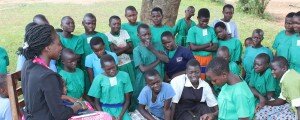School health project:
This Intervention is supported by GlobeMed, a student ran organization located in Washington University St Louis, USA. UDHA targets in school youth aged 10-25 years in 16 schools (5 primary and 5 Secondary schools) from Iganga Municipality and (4 primary and 4 secondary schools) from Luuka district. Sub County. The main objective is to empower youth to respond to their health needs. Every summer student volunteers from GlobeMed come to Uganda to monitor and see of the initiation of new projects and activities with the young people in the Project area. Among the activities include; training of youth peer health educators in SRH issues, counseling, referrals and health education in schools. All peer educators are supported by patrons who are teachers selected by various schools under the project. Patrons act as mentors for the peer health educators and a bridge between UDHA and the schools. As a result; schools have health boxes, in these health boxes students are able to write letters which are picked by project staff, answered and then delivered back to the students, The boxes are intended to dig out issues and personal concerns that will never surface during health education sessions by peer health educators.
Menstrual Dignity Project
“Earlier and more comprehensive education and discussion of menstruation and improved access to low-cost reusable pads is much-needed so that every girl can have her menstrual periods with dignity.”
 The study designed to assess knowledge about menstruation and access to reusable sanitary pad kits was headed by Marina Mai (Principle Reaseracher) supported by Dr. Bradley Stoner, Dr. Lewis Wall, and Dr. Shanti Parikh from Washington University and Association de santé publique de Genève. Findings from 10 schools in Iganga Municipality and 2 schools in Naigobya village, Bukooma Sub County -Luuka showed common themes of fear and shame surrounding menstruation. While a general understanding of good menstrual hygiene practices was relatively common, barriers to maintaining hygienic practices included: the structure of the school day, feelings of embarrassment, lack of money, poor accessibility of materials, boarding vs. day school atmospheres, latrine set-up, and rural vs. urban settings. The lack of preparation in terms of information and available sanitation materials before menarche is of great impact on girls’ experiences. Lack of access to affordable and reliable sanitary materials was the biggest challenge each month in a girl’s relationship to attending and focusing in school, but menstrual pain was also found to be a significant problem. (Read more)
The study designed to assess knowledge about menstruation and access to reusable sanitary pad kits was headed by Marina Mai (Principle Reaseracher) supported by Dr. Bradley Stoner, Dr. Lewis Wall, and Dr. Shanti Parikh from Washington University and Association de santé publique de Genève. Findings from 10 schools in Iganga Municipality and 2 schools in Naigobya village, Bukooma Sub County -Luuka showed common themes of fear and shame surrounding menstruation. While a general understanding of good menstrual hygiene practices was relatively common, barriers to maintaining hygienic practices included: the structure of the school day, feelings of embarrassment, lack of money, poor accessibility of materials, boarding vs. day school atmospheres, latrine set-up, and rural vs. urban settings. The lack of preparation in terms of information and available sanitation materials before menarche is of great impact on girls’ experiences. Lack of access to affordable and reliable sanitary materials was the biggest challenge each month in a girl’s relationship to attending and focusing in school, but menstrual pain was also found to be a significant problem. (Read more)
 (UDHA) Association de santé publique de Genève
(UDHA) Association de santé publique de Genève